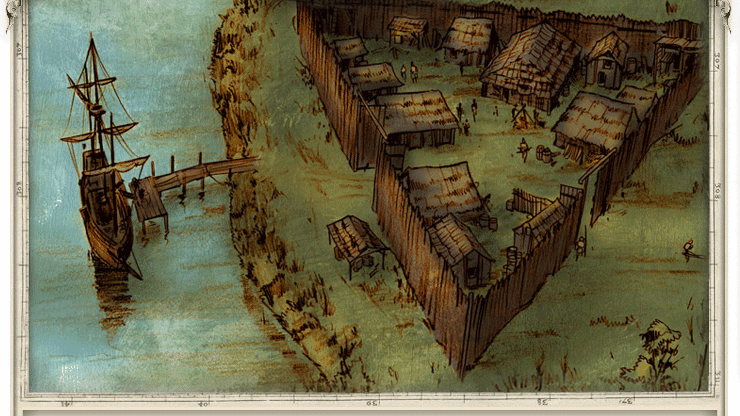Teaching Colonial America: Worksheets & Resources!

How to use effective Colonial America worksheets when teaching social studies students about the American Colonies!
An important period in early American history, the colonial period has shaped the country we live in today. Teaching students about the New England colonies, Middle colonies, and Southern colonies—from each respective region's geography, climate, and natural resources to the colonists relationships with Native Americans, their religious beliefs, and everyday colonial life—there's MUCH to cover!
In this article, we'll be exploring the key components to ensure that you're using the best lesson plans, resources, and worksheets when it comes to teaching your students ALL about Colonial America!
However, first things first, an essential tool when teaching students about Colonial America are well-crafted lesson plans that flow seamlessly from one lesson to the next. A well-designed lesson plan should include worksheets that are both in digital and printable format (i.e., PDF) and age-appropriate for your students grade level. There's nothing worse than only being able to use a printable worksheet when you or your district prefer using Google Classroom.
These worksheets should cover a variety of topics, such as the original colonies, the first colony, the New England Colonies, the Middle Colonies, and the Southern Colonies, the impact of religion and religious beliefs (religious tolerance), important historical figures like William Penn, Anne Hutchinson, and Lord Baltimore (among MANY others), significant groups of people like the Puritans and Quakers, and famous settlements such as Jamestown and New Amsterdam.
On top of all that, they should also emphasize the early forms of self governance (forms of representative government) that were established in the American colonies. For example, the Mayflower Compact, Virginia House of Burgesses, or the Fundamental Orders of Connecticut, to name just a few.
Here's some suggestions of my favorite types of Colonial America worksheets to use in my lesson plans
Timeline Worksheets
I like timeline worksheets because they can help students understand the chronological order of events that occurred during a specific historical time period, especially a time period that covered a long stretch of time and included numerous significant historical events such as during the time of Colonial America.
By organizing events into a timeline, students can see how certain events led to others, and often better infer how certain historical figures interacted with each other over time and/or played a key role in that era. This can help students understand the context of historical events and gain a better understanding of how Colonial America developed.
Timeline worksheet from my 8th Grade U.S. History Curriculum Bundle!
Map worksheets
These worksheets can help students visualize the geography of Colonial America, including the locations of the original 13 colonies and major cities. By understanding the physical layout of the colonies, students can gain insight into how geography influenced settlement patterns, trade, and other aspects of life in Colonial America.
Primary Source Analysis Worksheets
Primary source analysis worksheets can help students engage with primary source documents from Colonial America, for instance letters or artwork from the colonial era. By analyzing these sources, your students will gain a deeper appreciation and understanding of what life was like in Colonial America, including the perspectives and experiences of various groups of people. This can help students develop critical thinking skills and better understand how historical events and social structures shaped life in the colonies.
Multiple Choice Worksheets
Multiple choice worksheets are a good type of worksheet, depending on how they are designed and used!
For example, it's important to note that multiple choice worksheets alone may not be sufficient for teaching students about the complexities of Colonial America. While they can be useful for assessing knowledge and testing recall, they may not encourage critical thinking or deep understanding of historical events and concepts.
Keeping that in mind, a key benefit of multiple choice worksheets is that they can help your students practice and reinforce their knowledge of key concepts and facts related to Colonial America. By providing multiple options to choose from, multiple choice worksheets will help your students review and remember important information more effectively than if they were simply reading a textbook or listening to a lecture!
Multiple Choice Worksheet from my 8th Grade U.S. History Curriculum Bundle!
Fill in the Blank Worksheets
A major benefit of fill-in-the-blank worksheets is that they help students learn and retain their knowledge of key terms and concepts related to Colonial America. By providing a partially completed sentence or phrase, students are forced to recall and apply their knowledge of historical events and concepts which will help them better understand and remember important information.
Fill-in-the-blank worksheets can also be useful for promoting active learning and engagement in the classroom. By providing a worksheet that requires your students to actively participate in the learning process, they'll feel more involved and invested in their own learning.
Vocabulary Worksheets
I like vocabulary worksheets because they help your students develop a better understanding of the terminology used to describe the Colonial America time period. Vocabulary terms that will inevitably be used in later units of study. Terms such as "cash crops", "subsistence farming", and "mercantilism" to name a few.
By learning key vocabulary words and phrases, students will be able to more easily understand and interpret important primary sources and other historical documents from this time period, which can deepen their understanding of the events and concepts that shaped Colonial America!
Vocabulary worksheets are an excellent and useful tool in helping build and develop your students' knowledge of important people, events, and concepts as they relate to the Colonial America time period!
However, like almost any type of worksheet, I strongly encourage you to use vocabulary worksheets in conjunction with other types of worksheets and teaching methods to ensure that students are able to develop a comprehensive understanding of Colonial America. Vocabulary worksheets alone may not be sufficient for students to gain a thorough enough understanding of the complexities of the era, and because of this, it's important to supplement them with other types of activities and materials to provide a well-rounded learning experience.
Matching vocabulary terms worksheet from my 8th Grade U.S. History Curriculum Bundle!
Social Studies Worksheets for Each Colony
This type of a worksheet is great because it allows you to really emphasize a particular aspect such as a specific colony. For example, if you're teaching at a school in Rhode Island, you could have this worksheet focus on the history of the Colony of Rhode Island, its form of government, its religious beliefs, and famous people who lived there. The same goes for a worksheet that emphasizes New Jersey, which should cover daily life in New Jersey, incorporate primary source documents, and any fun facts that students might find interesting. The same can be done for ANY of the 13 original colonies whether it be New Hampshire, New York, North Carolina, South Carolina, or any others, which makes this a great and FLEXIBLE exercise!
Graphic Organizers and Venn Diagrams
In addition to other types of worksheets, traditional reading passages and/or comprehension questions, graphic organizers and Venn diagrams are an excellent way to engage students in the lesson. I love to use Venn diagrams to have my students compare and contrast different colonies, or the three colonial regions, while I like to use graphic organizers to have students organize information a specific component of Colonial America, say for example, daily life in the colonies.
Biographical Worksheets
These types of worksheets can help students learn about important figures from Colonial America, such as explorers, political leaders, and cultural figures. By focusing on individual lives and stories, students will gain additional insight into how different people contributed to the development of the colonies and shaped the course of history. This should help students better understand the complexity of historical events and appreciate the diversity of experiences that existed in Colonial America.
Other important factors and tips to keep in mind for using Colonial America lesson plans and resources!
Using Instructional Slide Deck
Instructional slide decks are a great way to present a lot of information in a fun and interactive way. Ideally, they should include a variety of elements that will help your students remain engaged throughout the entirety of the presentation. Such elements may include a "Bell Ringer!" slide to kick off the presentation, discussion-based questions (DBQ), short videos, clip art, maps, animations, and/or colorful images will ALL help make the presentation much more engaging for your students.
Fun Facts and Food Items to Teach about Colonial Times
To make the lessons even more engaging for your students, you could bake and bring in a common type of food that the colonists ate. This will really help bring Colonial America to life for your students when they realize how bland much of the food back then was (there were far less sweets and candy and no fast food back then, haha!)
You can include in your lessons various fun and amusing facts about the colonies. For example, during the 17th century, Virginia colonists used tobacco as currency!
Teaching About Religion and Native Americans
Religion and Native Americans played an important role in colonial times, and it's vitally important to teach students about these significant topics. Ensure that you lesson plans include information about religious freedom and the Church of England. I also recommend including information about the various relationships Native American peoples had with the colonists.
Teaching Different Grade Levels About Colonial America
It's also important that your lesson plans and worksheets fit the grade level you're teaching. For example, younger students may benefit from worksheets that focus on map skills and creative writing, whereas older students may benefit from worksheets that focus more on developing their critical thinking, research, and analysis skills, as well as incorporate the use of more primary source documents.
I hope this article has been helpful and provided value. Teaching students about Colonial America is an important part of their education and when you provide your students with proven, well-designed and curated worksheets it can dramatically improve their comprehension skills.
By using such worksheets, lessons, and resources, you'll no doubt help your students gain a better understanding of early American history and its impact on the United States today!
Imagine...
-
Spending more time on teaching and less on lesson plans
-
More time on nights and weekends to share with friends and loved ones
-
No longer endlessly searching for amazing lesson plans and resources
Click HERE to learn more about my amazing history curriculum bundles!
I *think* you'll be happy you did 😉
Check out what other teachers are saying about my bundles!



Thanks so much for reading!
-Jillian (a.k.a. the "Lesson Plan Guru")
Related Articles:
- The BEST Worksheets for Teaching the Thirteen Colonies
- Fun Facts of the Southern Colonies for Your History Lesson
- The BEST New England Colonies Worksheets for any grade!
- Economic Activities of the New England Colonies
- The Thirteen Colonies 8th Grade ULTIMATE Lesson Plan
- The Thirteen Colonies 5th Grade ULTIMATE Lesson Plan
- The Original Thirteen Colonies Chart Worksheets
Receive a FREE Week of Lesson Plans!
Join my mailing list to receive exclusive offers and promotions, the latest tips, and news on product updates!
Don't worry, your information will NEVER be shared.
I hate SPAM too and will NEVER sell it to a third-party. EVER











